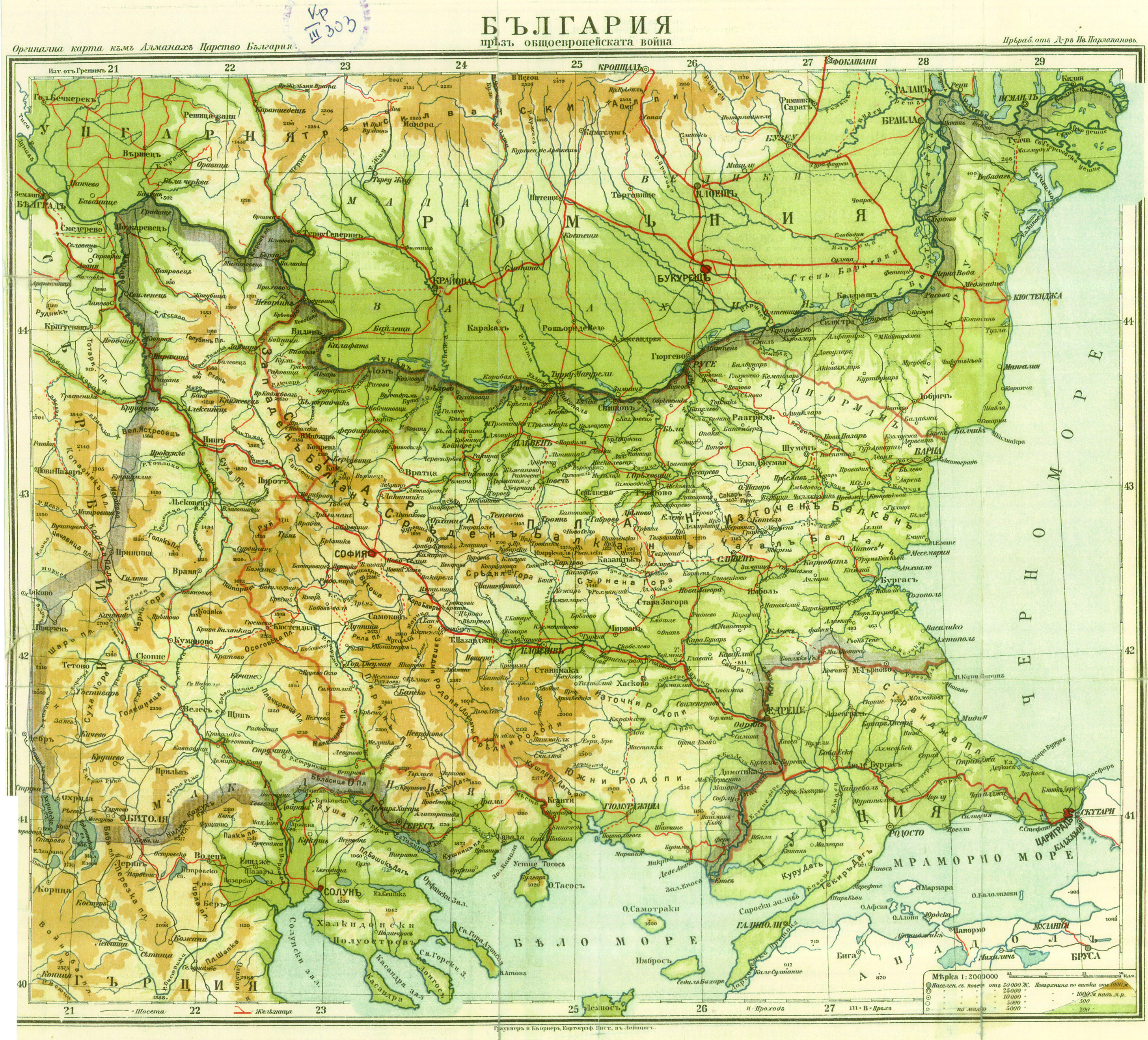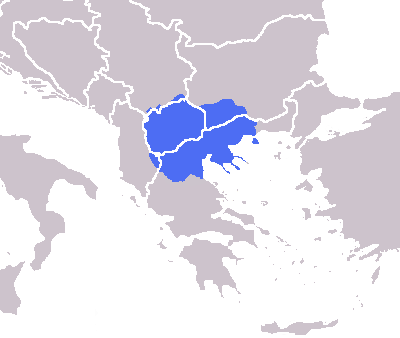|
Ohrana
Ohrana ( bg, Охрана, "Protection"; ) were armed collaborationist detachments organized by the former Internal Macedonian Revolutionary Organization (IMRO) structures, composed of Bulgarians in Nazi-occupied Greek Macedonia during World War II and led by officers of the Bulgarian Army. Bulgaria was interested in acquiring Thessalonica and Western Macedonia, under Italian and German occupation and hoped to sway the allegiance of the 80,000 Slavs who lived there at the time. The appearance of Greek partisans in those areas persuaded the Axis to allow the formation of these collaborationst detachments. However, during late 1944, when the Axis appeared to be losing the war, many Slavophone Nazi collaborators, Ohrana members and VMRO regiment volunteers fled to the opposite camp by joining the newly founded communist SNOF. The organization managed to recruit initially 1,000 up to 3,000 armed men from the Slavophone community that lived in the western part of Greek Macedonia. Backgr ... [...More Info...] [...Related Items...] OR: [Wikipedia] [Google] [Baidu] |
SNOF
The National Liberation Front ( mk, Народноослободителен фронт (НОФ), ''Narodnoosloboditelen front'' (NOF)), also known as the People's Liberation Front, was a communist political and military organization created by the Slavic Macedonian minority in Greece. The organization operated from 1945–1949, most prominently in the Greek Civil War. As far as its ruling cadres were concerned its participation in the Greek Civil War was nationalist rather than communist, with the goal of secession from Greece. Background Historical overview Late Ottoman era The 'Macedonian Question' surfaced in 1878, after the Treaty of Berlin had revised the short-lived ' Greater Bulgaria' established by the Treaty of San Stefano and turned back Macedonia under Ottoman control. During rise of nationalism in the Ottoman Empire, the Slavic speakers in Ottoman Macedonia were under the influence of the Bulgarian, Greek and Serbian religious, educational and military propa ... [...More Info...] [...Related Items...] OR: [Wikipedia] [Google] [Baidu] |
Macedonian Question
The region of Macedonia is known to have been inhabited since Paleolithic times. Еarliest historical inhabitants The earliest historical inhabitants of the region were the Pelasgians, the Bryges and the Thracians. The Pelasgians occupied Emathia and the Bryges occupied northern Epirus, as well as Macedonia, mainly west of the Axios River and parts of Mygdonia. Thracians, in early times occupied mainly the eastern parts of Macedonia, (Mygdonia, Crestonia, Bisaltia). The Ancient Macedonians are missing from early historical accounts because they had been living in the southern extremities of the region – the Orestian highlands – since before the Dark Ages. The Macedonian tribes subsequently moved down from Orestis in the upper Haliacmon due to pressure from the Orestae. Ancient Macedonians The name of the region of Macedonia ( el, Μακεδονία, ''Makedonia'') derives from the tribal name of the ancient Macedonians ( el, Μακεδώνες, ''Makedónes''). ... [...More Info...] [...Related Items...] OR: [Wikipedia] [Google] [Baidu] |
Internal Macedonian Revolutionary Organization
The Internal Macedonian Revolutionary Organization (IMRO; bg, Вътрешна Македонска Революционна Организация (ВМРО), translit=Vatrešna Makedonska Revoljucionna Organizacija (VMRO); mk, Внатрешна Македонска Револуционерна Организација, translit=Vnatrešna Makedonska Revolucionerna Organizacija), was a secret revolutionary society founded in the Ottoman territories in Europe, that operated in the late 19th and early 20th centuries. Founded in 1893 in Salonica, initially, it aimed to gain autonomy for Macedonia (region), Macedonia and Adrianople Vilajet, Adrianople regions in the Ottoman Empire, however, later it became an agent serving Kingdom of Bulgaria, Bulgarian interests in Balkan politics. IMRO group modeled itself after the Internal Revolutionary Organization of Vasil Levski and accepted its motto "Freedom or Death" (Свобода или смърть). Starting in 1896 it fought t ... [...More Info...] [...Related Items...] OR: [Wikipedia] [Google] [Baidu] |
Secret Police
Secret police (or political police) are intelligence, security or police agencies that engage in covert operations against a government's political, religious, or social opponents and dissidents. Secret police organizations are characteristic of authoritarian and totalitarian regimes. They protect the political power of a dictator or regime and often operate outside the law to repress dissidents and weaken political opposition, frequently using violence. History Africa Uganda In Uganda, the State Research Bureau (SRB) was a secret police organisation for President Idi Amin. The Bureau tortured many Ugandans, operating on behalf of a regime responsible for more than five hundred thousand violent deaths. The SRB attempted to infiltrate every area of Ugandan life. Asia China In East Asia, the ''jinyiwei'' (Embroidered Uniform Guard) of the Ming Dynasty was founded in the 1360s by the Hongwu Emperor and served as the dynasty's secret police until the collapse of Ming ru ... [...More Info...] [...Related Items...] OR: [Wikipedia] [Google] [Baidu] |
Mustafa Selaniki
Mustafa Selaniki ( tr, Selanıkî Mustafa; "Mustafa of Salonica; died 1600), also known as Selanıkî Mustafa Efendi, was an Ottoman scholar and chronicler, whose ''Tarih-i Selâniki'' described the Ottoman Empire of 1563–1599. See also *Salonica Thessaloniki (; el, Θεσσαλονίκη, , also known as Thessalonica (), Saloniki, or Salonica (), is the second-largest city in Greece, with over one million inhabitants in its metropolitan area, and the capital of the geographic region of ... 16th-century births 1600 deaths 16th-century historians from the Ottoman Empire {{Ottoman-bio-stub ... [...More Info...] [...Related Items...] OR: [Wikipedia] [Google] [Baidu] |
Hadji Khalfa
Hadji (also spelled ''Hajji'', ''Haji'' or ''Hatzi'') is a title and prefix that is awarded to a person who has successfully completed the Hajj ("pilgrimage") to Mecca. It may refer to: People * El Hadji Diouf (born 1981), Senegalese footballer * El Hadji Guissé, Senegalese judge * Hadji Murad (c. 1790–1852), Caucasian leader * Mustapha Hadji (born 1971), Moroccan international footballer * Youssouf Hadji (born 1980), Moroccan international footballer (and Mustapha's younger brother) * Samir Hadji (born 1989), French footballer * Stelios Haji-Ioannou (born 1967), Cypriot entrepreneur *Hajji Ebrahim Shirazi (1745–1801), kalantar of Shiraz and Grand Vizier under the Qajars Fictional * Hadji (character) ''Jonny Quest'' (also known as ''The Adventures of Jonny Quest'') is an American animated science fiction adventure television series about a boy who accompanies his scientist father on extraordinary adventures. It was produced by Hanna-Barbera, ..., an Indian protagonist i ... [...More Info...] [...Related Items...] OR: [Wikipedia] [Google] [Baidu] |
Evliya Çelebi
Derviş Mehmed Zillî (25 March 1611 – 1682), known as Evliya Çelebi ( ota, اوليا چلبى), was an Ottoman explorer who travelled through the territory of the Ottoman Empire and neighboring lands over a period of forty years, recording his commentary in a travelogue called the '' Seyâhatnâme'' ("Book of Travel"). The name Çelebi is an honorific title meaning "gentleman" or "man of God" (see pre-1934 Turkish naming conventions). Life Evliya Çelebi was born in Constantinople in 1611 to a wealthy family from Kütahya. Both his parents were attached to the Ottoman court, his father, Derviş Mehmed Zilli, as a jeweller, and his mother as an Abkhazian relation of the grand vizier Melek Ahmed Pasha. In his book, Evliya Çelebi traces his paternal genealogy back to Ahmad Yasawi, an early Sufi mystic. Evliya Çelebi received a court education from the Imperial ''ulama'' (scholars). He may have joined the Gulshani Sufi order, as he shows an intimate knowledge of their ... [...More Info...] [...Related Items...] OR: [Wikipedia] [Google] [Baidu] |
Bulgarian Exarchate
The Bulgarian Exarchate ( bg, Българска екзархия, Balgarska ekzarhiya; tr, Bulgar Eksarhlığı) was the official name of the Bulgarian Orthodox Church before its autocephaly was recognized by the Ecumenical See in 1945 and the Bulgarian Patriarchate was restored in 1953. The Exarchate (a de facto autocephaly) was unilaterally (without the blessing of the Ecumenical Patriarch) promulgated on , in the Bulgarian church in Constantinople in pursuance of the firman of Sultan Abdülaziz of the Ottoman Empire. The foundation of the Exarchate was the direct result of the struggle of the Bulgarian Orthodox against the domination of the Greek Patriarchate of Constantinople in the 1850s and 1860s. In 1872, the Patriarchate accused the Exarchate that it introduced ''ethno-national'' characteristics in the religious organization of the Orthodox Church, and the secession from the Patriarchate was officially condemned by the Council in Constantinople in September 1872 a ... [...More Info...] [...Related Items...] OR: [Wikipedia] [Google] [Baidu] |
Ecumenical Patriarchate Of Constantinople
The Ecumenical Patriarchate of Constantinople ( el, Οἰκουμενικὸν Πατριαρχεῖον Κωνσταντινουπόλεως, translit=Oikoumenikón Patriarkhíon Konstantinoupóleos, ; la, Patriarchatus Oecumenicus Constantinopolitanus; tr, Rum Ortodoks Patrikhanesi, İstanbul Ekümenik Patrikhanesi, "Roman Orthodox Patriarchate, Ecumenical Patriarchate") is one of the fifteen to seventeen autocephalous churches (or "jurisdictions") that together compose the Eastern Orthodox Church. It is headed by the Ecumenical Patriarch of Constantinople, currently Bartholomew, Archbishop of Constantinople. Because of its historical location as the capital of the former Eastern Roman (Byzantine) Empire and its role as the mother church of most modern Orthodox churches, Constantinople holds a special place of honor within Orthodoxy and serves as the seat for the Ecumenical Patriarch, who enjoys the status of '' primus inter pares'' (first among equals) among the world's E ... [...More Info...] [...Related Items...] OR: [Wikipedia] [Google] [Baidu] |
Macedonians (Bulgarians)
Macedonians or Macedonian Bulgarians ( bg, македонци or македонски българи), sometimes also referred to as Macedono-Bulgarians, Macedo-Bulgarians, or Bulgaro-Macedonians are a regional, ethnographic group of ethnic Bulgarians, inhabiting or originating from the region of Macedonia. Today, the larger part of this population is concentrated in Blagoevgrad Province but much is spread across the whole of Bulgaria and the diaspora. History The Slavic-speaking population in the region of Macedonia had been referred to both (by themselves and outsiders) as Bulgarians, and that is how they were predominantly seen since 10th, up until the early 20th century. According to Encyclopædia Britannica, at the beginning of the 20th century the Macedonian Bulgarians constituted the majority of the population in the whole region of Macedonia, then part of the Ottoman Empire. The functioning of the Bulgarian Exarchate then aimed specifically at differentiat ... [...More Info...] [...Related Items...] OR: [Wikipedia] [Google] [Baidu] |
Serbia
Serbia (, ; Serbian language, Serbian: , , ), officially the Republic of Serbia (Serbian language, Serbian: , , ), is a landlocked country in Southeast Europe, Southeastern and Central Europe, situated at the crossroads of the Pannonian Basin and the Balkans. It shares land borders with Hungary to the north, Romania to the northeast, Bulgaria to the southeast, North Macedonia to the south, Croatia and Bosnia and Herzegovina to the west, and Montenegro to the southwest, and claims a border with Albania through the Political status of Kosovo, disputed territory of Kosovo. Serbia without Kosovo has about 6.7 million inhabitants, about 8.4 million if Kosvo is included. Its capital Belgrade is also the List of cities in Serbia, largest city. Continuously inhabited since the Paleolithic Age, the territory of modern-day Serbia faced Slavs#Migrations, Slavic migrations in the 6th century, establishing several regional Principality of Serbia (early medieval), states in the early Mid ... [...More Info...] [...Related Items...] OR: [Wikipedia] [Google] [Baidu] |
Greeks
The Greeks or Hellenes (; el, Έλληνες, ''Éllines'' ) are an ethnic group and nation indigenous to the Eastern Mediterranean and the Black Sea regions, namely Greece, Cyprus, Albania, Italy, Turkey, Egypt, and, to a lesser extent, other countries surrounding the Mediterranean Sea. They also form a significant diaspora (), with Greek communities established around the world.. Greek colonies and communities have been historically established on the shores of the Mediterranean Sea and Black Sea, but the Greek people themselves have always been centered on the Aegean and Ionian seas, where the Greek language has been spoken since the Bronze Age.. Until the early 20th century, Greeks were distributed between the Greek peninsula, the western coast of Asia Minor, the Black Sea coast, Cappadocia in central Anatolia, Egypt, the Balkans, Cyprus, and Constantinople. Many of these regions coincided to a large extent with the borders of the Byzantine Empire of the late 11th cent ... [...More Info...] [...Related Items...] OR: [Wikipedia] [Google] [Baidu] |





